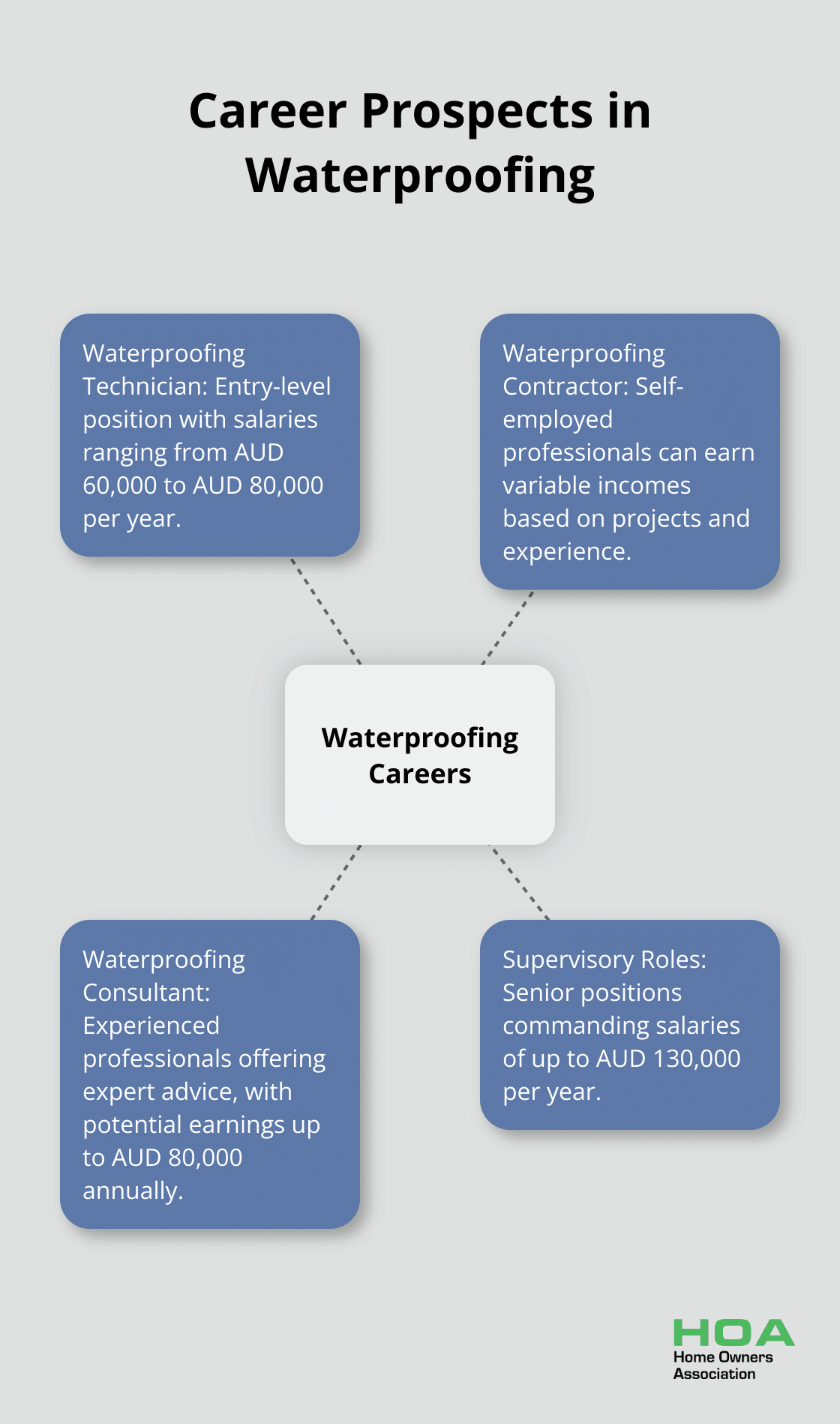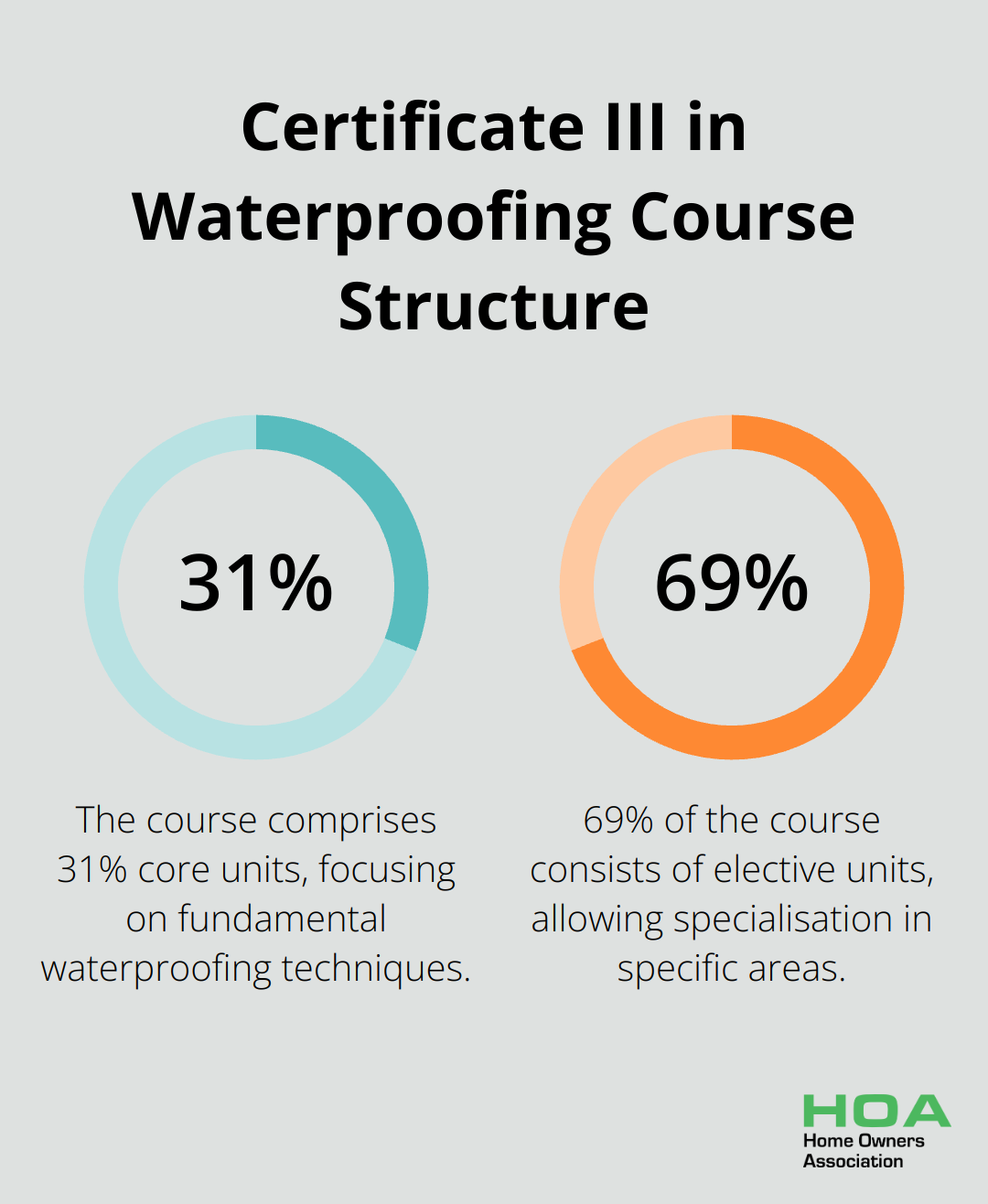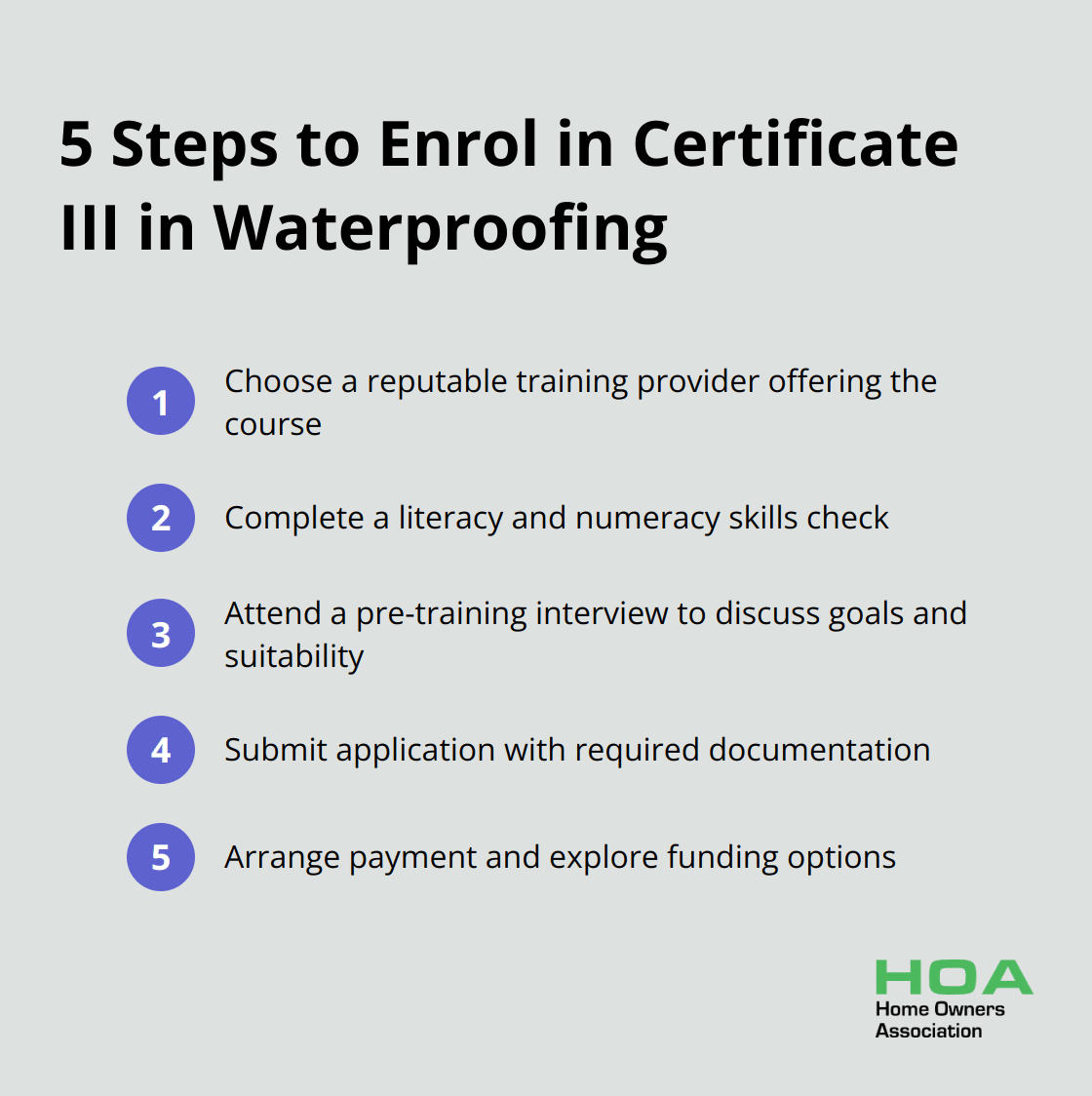
At Home Owners Association, we understand the importance of proper waterproofing for maintaining the integrity of your property.
Are you interested in becoming a certified waterproofing professional? Earning a Certificate III in Waterproofing can open up exciting career opportunities in this essential field.
In this blog post, we’ll guide you through the process of obtaining this valuable qualification, from understanding the course structure to navigating the enrolment process.
What Is Certificate III in Waterproofing?
Overview of the Qualification
Certificate III in Construction Waterproofing is a nationally recognised qualification that prepares individuals for success in the waterproofing industry. This qualification is designed to meet the needs of workers who undertake waterproofing for residential and commercial construction work.
Course Content and Skills
Students who enrol in this program learn to prepare surfaces, apply waterproofing materials, and ensure proper sealing in various settings. The curriculum includes hands-on training in applying waterproofing processes to internal and external wet areas, basements, and rooftops. Participants also develop proficiency in workplace communication, safety procedures, and effective work planning.
Career Prospects
The waterproofing industry continues to grow, with the Australian Government projecting employment growth for industries, occupations and skills over the next five years. Graduates of this program can pursue careers as waterproofing technicians, contractors, or consultants. The average salary for waterproofing professionals in Australia ranges from AUD 60,000 to AUD 80,000 per year, with supervisory roles commanding up to AUD 130,000 annually.

Industry Recognition and Licensing
After completing the Certificate III in Waterproofing, graduates become eligible to apply for a waterproofing licence from NSW Fair Trading. This licence is essential for those who want to work independently or start their own waterproofing business. The qualification receives recognition across Australia, allowing for flexibility in employment opportunities nationwide.
Growing Demand for Skilled Professionals
Homeowners increasingly recognise the importance of proper waterproofing in maintaining property value and preventing costly water damage. This trend underscores the value of obtaining a Certificate III in Waterproofing for those looking to enter or advance in this field. The next section will explore the course structure and content in more detail, providing insight into the specific skills and knowledge you’ll gain through this qualification.
What Does the Certificate III in Waterproofing Course Cover?
Core Units and Specialised Skills
The Certificate III in Waterproofing course equips students with comprehensive skills for a successful career in the waterproofing industry. The curriculum balances theoretical understanding and practical application, ensuring job-ready graduates.
The course consists of 16 units of competency (5 core units and 11 elective units). Core units focus on fundamental waterproofing techniques, workplace safety, and effective communication. Students learn to apply waterproofing processes to internal and external wet areas, basements, and rooftops. They also master surface preparation, material selection, and proper sealing in various settings.
Elective units allow students to tailor their learning to specific interests or industry demands. These may include wall and floor tiling, operating elevated work platforms, and working safely at heights. The flexibility in elective choices aligns qualifications with career aspirations or local industry needs.

Hands-on Training and Industry Experience
A significant portion of the course dedicates itself to practical training, typically conducted in industry-standard workshops. Experienced instructors lead these hands-on sessions, bringing real-world expertise to the classroom. Students work with current tools and materials, replicating actual job site conditions.
Some training providers offer block training or apprenticeship options (allowing students to gain on-the-job experience while completing their studies). This approach enhances learning and provides valuable industry connections for future employment opportunities.
Assessment Methods and Course Duration
The Certificate III in Waterproofing course uses diverse assessment techniques to evaluate both theoretical knowledge and practical skills. Methods include written assessments, practical demonstrations, and third-party evaluations. This comprehensive approach ensures graduates’ competence in all aspects of waterproofing work.
Course duration varies depending on the mode of study and individual circumstances. Starting an apprenticeship is one of the best ways to gain hands-on experience, develop valuable skills, and build a rewarding career in Australia.
Choosing a Training Provider
The quality of education and industry connections provided by the institution can significantly impact future career prospects in the waterproofing industry. Prospective students should carefully consider their study options and select a reputable training provider.
Home Owners Association recommends thorough research when selecting a course provider. Look for institutions with strong industry partnerships, modern facilities, and experienced instructors. These factors contribute to a more comprehensive and relevant learning experience, better preparing students for the challenges of the waterproofing profession.
The next section will explore the enrolment process and prerequisites for the Certificate III in Waterproofing course, helping you take the first steps towards your new career in this growing industry.
How to Enrol in a Certificate III in Waterproofing Course
Eligibility and Prerequisites
To enrol in a Certificate III in Waterproofing course, you must be at least 18 years old. While formal qualifications aren’t always mandatory, many training providers recommend two years of industry experience. This background helps students understand complex concepts more easily and apply their learning effectively in practical situations.
A key prerequisite is the completion of a general construction induction training (white card). This card is mandatory for anyone entering a construction site in Australia and covers essential safety knowledge. If you don’t have a white card, most training providers offer this as part of their program or can direct you to approved courses.
Application Process
The application process varies slightly between training providers, but generally follows these steps:

- Choose a training provider: Research reputable institutions offering the Certificate III in Waterproofing. Consider factors like course duration, delivery mode (online, in-person, or blended), and industry connections.
- Complete a skills check: Many providers require a literacy and numeracy assessment to ensure you have the basic skills needed for the course. This isn’t a pass/fail test but helps identify any areas where you might need additional support.
- Attend a pre-training interview: This is your opportunity to discuss your goals, ask questions about the course, and ensure it’s the right fit for you. The training provider will also use this time to assess your suitability for the program.
- Submit your application: Provide all required documentation, which typically includes proof of identity, any relevant qualifications or experience, and your white card certification. You may also need to provide a résumé or CV summarising your work experience, education, and skills.
- Arrange payment: Explore funding options such as government subsidies or apprenticeship programs. For example, in Queensland, free apprenticeships are available for individuals under 25, covering the costs of training for eligible participants.
Recognition of Prior Learning
If you have existing skills or experience in waterproofing, you may qualify for Recognition of Prior Learning (RPL). This process can significantly reduce the time and cost of obtaining your qualification.
RPL is a formal process that evaluates your existing skills, knowledge, and work experience to award nationally recognised certifications. To apply for RPL:
- Gather evidence of your skills and experience (work samples, references from employers, or certificates from previous training).
- Submit your evidence to the training provider for assessment.
- Complete a skills assessment, which may involve practical demonstrations or interviews with assessors.
- Receive credit for the units where you’ve demonstrated competency.
RPL can be a valuable pathway, especially for those already working in the construction industry who want to formalise their waterproofing skills.
Selecting the Right Training Provider
The choice of training institution is important for your success. Look for providers with strong industry connections, as these relationships often lead to better job prospects upon graduation. Try to check if the provider is endorsed by state or national building authorities, as this ensures the training meets industry standards.
Additionally, consider the support services offered. Many institutions provide language and literacy assistance, disability support, and career counselling. These services can help you complete your qualification successfully and transition into the workforce.
Final Thoughts
A Certificate III in Waterproofing opens doors to a rewarding career in the construction industry. This nationally recognised qualification equips you with essential skills in surface preparation, waterproofing application, and safety procedures. The course structure balances theoretical knowledge with hands-on experience, ensuring you become job-ready upon graduation.
The growing demand for skilled waterproofing professionals in Australia translates to excellent job prospects and competitive salaries. Potential earnings range from AUD 60,000 to AUD 130,000 per year, depending on experience and role. This career path offers financial stability and growth opportunities for those who pursue it.
For homeowners in Melbourne seeking certified waterproofing professionals or advice on home improvement projects, the Home Owners Association offers valuable resources and support. Their expertise helps ensure waterproofing projects meet the highest standards of quality and compliance. Take the first step towards your new career in waterproofing today.





